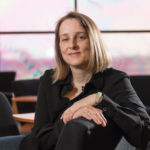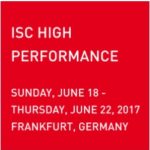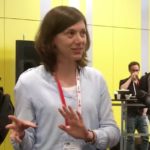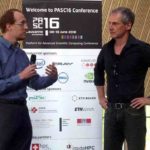Today the PASC17 Conference announced that this year’s plenary presentation will be entitled “Unlocking the Mysteries of the Universe with Supercomputers.” The plenary presentation will be given by Katrin Heitmann, Senior Member of the Computation Institute at the University of Chicago and the Kavli Institute for Physical Cosmology, USA.
Call for Exhibitors: PASC17 in Lugano
“The PASC17 Conference offers a unique opportunity for your organization to gain visibility at a national and international level, to showcase your R&D and to network with leaders in the fields of HPC simulation and data science. PASC17 builds on a successful history – with 350 international attendees in 2016 – and continues to expand its program and international profile year on year.”
ISC 2017 and PASC17 Conferences Scheduled Back-to-Back
Today the ISC 2017 and the PASC17 announced that these two key events in the European HPC ecosystem have been scheduled back to back in June. “ISC 2017, which will be held from June 18 to 22 in Frankfurt, Germany, is expected to attract over 3000 attendees, including top managers, researchers, engineers, architects and sales and marketing staff from business and public institutions. Following ISC 2017, researchers from academia, national labs and industry will gather in Lugano, Switzerland, for PASC17, an interdisciplinary conference in HPC that brings together domain science, applied mathematics and computer science.”
Matthias Troyer from Microsoft to Speak on Quantum Computing at PASC17
Today the PASC17 Conference announced that Matthias Troyer from Microsoft Research will give this year’s public lecture on the topic “Towards Quantum High Performance Computing.” The event will take place June 26-28 in Lugano, Switzerland.
Video: PASC17 Conference Seeks Papers, Minisymposia, and Posters
In this video, Jeff Hollingsworth from SIGHPC and Michele De Lorenzi from CSCS invite you to submit papers, minisymposia proposals and posters to the PASC17 Conference, an interdisciplinary conference in HPC that brings together domain science, applied mathematics and computer science. PASC17 will be held June 26-28, 2017 in Lugano, Switzerland.
CSCS in Switzerland to Celebrate 25 Years of Supercomputing
Over at CSCS, Simone Ulmer writes that the Swiss National Supercomputing Centre is turning twenty-five. First opened in 1991, CSCS supports users from Swiss and international institutions in their top-flight research and runs computers as a service facility for research associations and MeteoSwiss.
PASC17 Conference to Focus on HPC & Precision Medicine
Today the PASC17 Conference announced a track focused on Precision Medicine as Special Topic for Emerging Domains. “Precision medicine, also referred to as personalized medicine, is an emerging domain that is adding tremendous value to the study of life sciences and medical treatment. The requirements that it has for rapid – and secure – processing, analysis and management of vast quantities of data in a wide range of different medical environments make precision medicine ideally suited to high performance computing.”
Call for Papers: PASC17 Conference in Lugano
The PASC17 Conference has issued its Call for Submissions. Co-sponsored by ACM and SIGHPC, the event will take place June 26-28, 2017 in Lugano, Switzerland. “The PASC Conference is an interdisciplinary event in high performance computing that brings together domain science, applied mathematics and computer science – where computer science is focused on enabling the realization of scientific computation.”
Video: PASC16 Poster on Peptide Simulation
In this video from PASC16, Annick V. Renevey from ETH Zurich describes her award-winning poster on peptide simulations at CSCS.
Interview: Peter Bauer from ECMWF at PASC16
In this video from PASC16, Peter Bauer from ECMWF shares his perspectives on the conference and his work with high performance computing for weather forecasting. “ECMWF specializes in global numerical weather prediction for the medium range (up to two weeks ahead). We also produce extended-range forecasts for up to a year ahead, with varying degrees of detail. We use advanced computer modeling techniques to analyze observations and predict future weather.”











